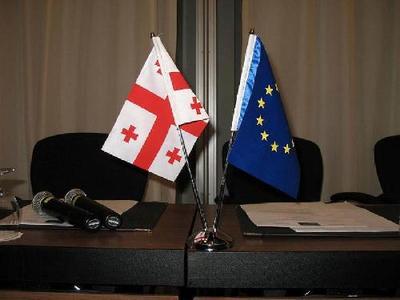
EU opens door for visa-free travel from Georgia
The Commission adopted today the fourth and last progress report on Georgia's implementation of the action plan on visa liberalisation (VLAP). The progress report highlights the significant headway made by Georgia to meet the criteria for visa liberalisation.
Following the positive assessment of the progress report and taking into account the overall EU-Georgia relations, the Commission will present in early 2016 a legislative proposal to the Council and the European Parliament to lift visa requirements for Georgian citizens holding a biometric passport - amending Regulation (EC) No 539/2001.
Commissioner for Migration, Home Affairs and Citizenship, Dimitris Avramopoulos said: "I am very pleased that Georgian citizens with a biometric passport will soon be able to travel to the Schengen area for short stays without a visa. The hard work of the Georgian authorities over the past three years towards achieving this important goal for the benefit of Georgian citizens has given positive results. Now it is important to keep upholding all standards."
The EU-Georgia Visa Dialogue has proved to be an important and particularly effective tool for advancing far-reaching and difficult reforms in the Justice and Home Affairs area and beyond, impacting on areas such as the rule of law and justice reform. Beyond the VLAP benchmarks, Georgia has taken further steps to reform the judiciary as well as the Prosecutor's Office.
The visa-free travel will apply to all EU Member States, except for Ireland and UK, as well as the four Schengen associated countries (Iceland, Liechtenstein, Norway and Switzerland). The exemption from visa requirement concerns only short-stays, up to 90 days in any 180-day period for business, touristic or family purposes.
Based on the Commission's assessment, and given the outcome of the continuous monitoring and reporting carried out since the launch of the EU-Georgia Visa Liberalisation Dialogue in June 2012, the Commission considers that Georgia has made the necessary progress and undertaken all the required reforms to ensure effective and sustainable achievement of all the benchmarks set in the four blocks of the second phase of the VLAP. Georgia has taken the actions demanded by the recommendations of the third progress report to ensure effective and sustainable implementation of its legislative framework in the fields of migration management, asylum, anti-corruption, drugs, trafficking in human beings, money-laundering, law-enforcement cooperation, and citizens' rights.
Background.
The enhanced mobility of citizens in a secure and well-managed environment is one of the core objectives of the Eastern Partnership. To this end, the EU carries out Visa Liberalisation Dialogues with interested partner countries.
The main tool of the dialogue is the Visa Liberalisation Action Plan which is tailor-made for each partner country and structured around four blocks concerning i) document security, including biometrics; ii) integrated border management, migration management, asylum; iii) public order and security; and iv) external relations and fundamental rights.
The EU-Georgia Visa Liberalisation Dialogue was launched on 4 June 2012 and the Visa Liberalisation Action Plan was presented to the Georgian authorities on 25 February 2013. These benchmarks were set with a view to adopting a legislative, policy and institutional framework (phase 1) and ensuring its effective and sustainable implementation (phase 2).
In its first progress report adopted in November 2013 the Commission made a number of recommendations for completing the first legislative and planning phase. In October 2014, the Commission adopted its second progress report which concluded that Georgia had fulfilled the first-phase benchmarks of the VLAP and was ready to be assessed on the second-phase benchmarks. In its conclusions of 17 November 2014, the Council concurred with the Commission's assessment. The Commission adopted the third progress report on Georgia's implementation of the VLAP on 8 May 2015. The report took note of significant progress made by the Georgian authorities in implementing the second phase of the VLAP and acknowledged the fulfilment of many benchmarks under the four blocks. Today's report is the fourth and last progress report.